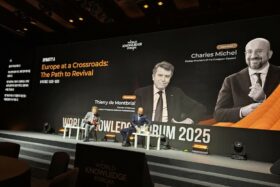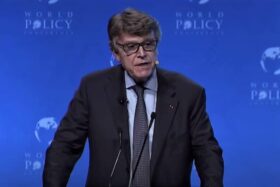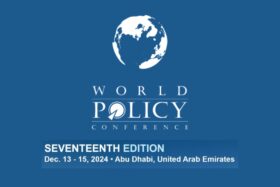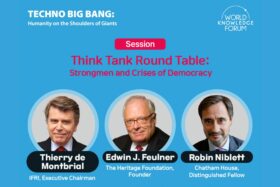By the time I started thinking, around 2005-2006, about creating what would become the World Policy Conference, the utopia of liberal globalization, which had emerged concomitantly with the fall of the Soviet Union, had already lost some of its luster. I succinctly summed up this pipedream as a sort of abstract chemical reaction called Fukuyama’s formula, named after the American political scientist who trumpeted “the end of history”:
democracy + market economy < = > peace + prosperity.
Intellectually, the equation falls flat on two counts. First, none of its four terms is completely and unambiguously definable. Second, even assuming that such definitions did exist, they would tell us nothing about the historical processes likely to pave the way for democracy and the market economy on the one hand, and peace and prosperity on the other, when the starting point is far from an ideal objective situation. There is no such thing as spontaneous generation, in life, in this or any other realm.
The first major reality check came on September 11, 2001, whose ramifications instantly rumbled across the entire planet. Since that shocking day, we have known that small, fanaticized groups bent on twisting religious beliefs to suit their ideology and use of terrorism are all it takes to stoke hatred and, ultimately, instability worldwide.
The end-of-history ideology would have held up only if major territorial, economic or other conflicts had been settled first. But then, assuming that such a situation could even be imagined, Fukuyama’s formula would amount to a simple tautology. For example, the harmonious pairing of democracy and the market economy would necessarily imply a social contract capable of addressing the sense that wealth and power are unjustly distributed—a tall order about which great intellectuals such as the Indian economist Amartya Sen have extensively written.
Since its inception, the World Policy Conference project has been based on an objective and non-normative view of the world. Today’s globalization has no historical precedent because it is driven by a torrent of technology, coming from the United States, that has been steadily growing for at least sixty years. The instantaneous transmission of information in ever-increasing quantities is the hallmark of this wave. Depending on one’s point of view, it is the best or worst of worlds. It can promote progress towards the common good, or it can fan the flames of hatred. But while progress inches forward step by step, hatred spreads with the speed of an epidemic. It eventually dies out, but only after the fires that sustained it have been extinguished, sometimes long afterwards.
Three simple ideas have underpinned the WPC project from the outset. The first is that the objective foundations of globalization are irreversible. This means that all of us must adapt to it the best we can. Not by tearing down borders in the literal sense of the term, which would be the quickest way to bring about the shock of civilizations that kept Samuel Huntington up at night, but by fostering cautiously openness to others so that everyone can benefit from the diversity of an international society that is heterogeneous by nature. In reaction to the consequences of too much openness, we risk closing ourselves off from other to such an extent that the world might again be divided into blocs. What I am expressing is the concept of a reasonably open world.
The second idea is that of governance, a term that is often used but seldom precisely defined. This is a matter neither of world government, still inconceivable for the foreseeable future, nor of international law, as though States could delegate the regulation of the international system to judges, in other words, potentially, to artificial intelligence. For a long time to come, such regulation can only result from groups of States and institutions working together coherently to ensure the system’s structural stability. The objective is to stay close to a balance that is continually shifting under the action of multiple social, economic, political or other forces, since the figure of change is indissolubly linked to that of time. The balance I am talking about is not just one of power. The need for structural stability implies searching together for a balance between each stakeholder’s fundamental interests, which means each taking the other’s points of view into account, as unseemly as some of their aspects may seem. In this respect, I am Kissingerian.
Good governance means not allowing imbalances to grow so severe that conflicts could not be resolved by peaceful means. Without claiming to assign responsibility, it is clear in my mind that the fall of the Soviet Union upended the security situation in Europe, and that the main stakeholders have never addressed the issue as such. Likewise, as events in recent weeks have painfully recalled, the Israeli-Palestinian conflict has been simmering on the back burner for years but was always about to boil over. The first condition for progress in the idea of governance is for the States and institutions concerned to clearly share the objective. If they do not, opening up the international system increases geopolitical and geostrategic risks rather than reducing them.
The third idea driving the WPC is that of the medium-size power. When I founded this conference, I made it clear that the event would not be “Western” in spirit in the sense of the alliances that were sealed around the United States after the Second World War, or even from the point of view of cultures or civilizations. On the contrary, I see no contradiction between being attached to one’s own culture or civilization and the respect that is due to those of others. Bearing this in mind, it troubles me when I hear the president of the United States say that his country is the natural leader of the “democracies” against the “autocracies”, because he does not define what a “real” democracy or autocracy is. As this ambiguity clearly does not apply to China in his eyes, such a stance means it is hardly possible to make any significant headway in areas of common interest, like the fight against climate change or pandemics. The WPC rejects simplistic political classifications, and its point of view is not aligned with that of the great powers, whatever they may be. It gives voice to the “middle powers”, i.e. States that, without necessarily being endowed with large resources, are nevertheless determined to devote some of them to making a positive contribution to global governance.
The first great global shock of the twentieth century came on September 11, 2001. The consequences of this event, and of the American policies that ensued, especially in Afghanistan, are still reverberating across the globe. But that was just the first in a series of major events which, together, revealed how fragile the international system remains today. The first WPC took place in Evian on October 6-8, 2008, at the same time as a critical moment in the subprime crisis, when Lehman Brothers failed and the specter of the 1929 crash and the Great Depression loomed over the horizon. Those attending Evian included Jean-Claude Trichet, then president of the European Central Bank, who, with his central bank counterparts, played the key role in averting a crash. Since then, the international monetary system has withstood several tests, including the tremendous structural shock caused by the West’s response to the Ukrainian war. This event largely, but not only, fueled the return of inflation and of policies the likes of which had not been seen in thirty years, and whose effects are partially unforeseeable. The second major jolt was the poorly named “Arab Spring” of 2011, which set the Middle East ablaze, not to mention Libya, whose breakdown contributed to the destabilization of the Sahel. One consequence of this overarching fiasco has been uncontrolled migration to Europe. I imagine that here, too, historians will pass harsh judgement on how these crises were managed, or rather not managed at all.
Closer to us, the Covid 19 pandemic shook societies and economies worldwide, and should have served as a warning to strengthen global health governance, notably through the World Health Organization. Unfortunately, as we shall see during this WPC, the overall deterioration of the international system is holding back the necessary reforms, so that we could find ourselves at any time in a situation comparable to that of 2019-2020, or even worse.
No sooner had the pandemic “ended” when Russia’s invasion of Ukraine opened up a new chapter in the history of Europe and in the West’s relations with the rest of the world. This period is all the more fraught with uncertainty given that the war is likely to drag on or freeze over in a Korean-style scenario with immense global consequences.
The unprecedentedly barbaric attack on Israel by Hamas on October 7 added an extra layer of uncertainty on a scale that would have been almost unthinkable until now. The slaughter took Israel and its allies completely by surprise and shows once again that technology must never be relied upon entirely to ensure security. Lastly, an additional category of uncertainties intrinsically linked to technological progress, such as artificial intelligence, will have repercussions that are largely unpredictable, even in the medium term.
That, in a nutshell, is where we stand. There are very few places where personalities from the five continents, in search of effective governance that will benefit international society as a whole, can express themselves in confidence. The way forward must be inspired by deeper collective reflection on the idea of justice because, I repeat, a sense of injustice is the main fuel for hatred. A minimum of justice, even more than material prosperity, is necessary for peace. May all of us, organizers and participants, remain faithful to the spirit of the WPC and never forget that, however modest our contribution to peace, it is expected and therefore useful, not to say necessary.



